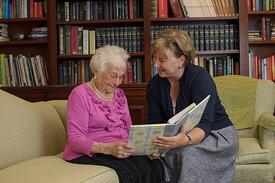A Blog by Jim Stinson, Director of Spiritual Life for United Methodist Homes
“Do you Remember when, Grandma…?”

As my family was waiting for Thanksgiving dinner to be ready they were doing what most families do at holiday time. They were reminiscing. Since “Grandma” always lived with us she was a source of many memories, especially as she grew older and had ever-greater senility. No one was ever sure what she would say or when she would say it.
Consequentially the stories and the memories are plentiful. While we were sharing stories I got to thinking about how often the folks who live at the United Methodist Homes (where I work as the Director of Spiritual Life) tell their stories.
This can sometimes become tedious listening to the same stories day after day. But when I am at my best, I listen to them as if it was the first time I heard them. For I know the story telling serves a need and a purpose. Which is what I want to discuss.
Storytelling and Story Listening
Storytelling and story listening is a vital part of caring for and about older adults. Story telling validates the value of the years they have already lived. In a time when so many of their loved ones and family members have died it is a way of reconnecting with important, life defining, relationships and connections.
In a time of decreased opportunities to forge new relationships it is important to know that they have been important to others, that their lives have made a difference. Telling the stories allows them to feel connected again with the ones being remembered as well as to sense the connection with the one interested in hearing the story. There is no more important aspect of working with older adults than taking an active interest in their stories.
Discovering the Next Chapter…..
Story telling also often motivates a person to move on to the possibility of creating new opportunities for their stories to continue. I have been privileged to be a part of our Vital Life Story program at UMH whereby we solicit the life stories of our residents. After hearing their stories and sharing the written story with them my favorite act follows.
I tell them how impressed I am with their story and wonder what the next chapter will be about. It is often the first time they have been asked or thought about such a possibility. The discovery that more is still possible and still expected comes as a great surprise to them. But the real surprise is the frequency with which they share dreams they still have and still hope to fulfill. It is often the beginning of a new outlook on the future.
Encourage the Stories!
So encourage the stories. Listen closely! Encourage the next chapter. As the saying goes, help them to discover, “It aint over til the fat lady sings.” Help them to discover that no matter the infirmities and the limits there is always the possibility and the joy of creating and building new relationships.
Key Takeaways
-
Reminiscing is an important part of life, especially for older adults.
-
Storytelling and story listening is a vital part of caring for and about older adults.
-
Story-telling can help motivate your loved one to move on to the possibility of creating new opportunities for their stories to continue.
Encourage your loved one to share their stories and listen closely!







